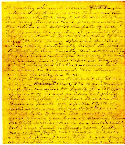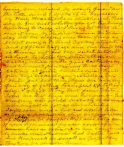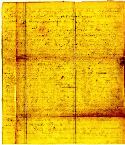Letter to Emmet Brooks
Summary:
Charles Brooks tells about his regiment's movements and
participation in skirmishes in the days leading up to the Second Battle
of Manassas. He also describes various attempts by soldiers to
leave the service.
ALS
.pp
August 21, 1862
Charles Brooks to Emmet Brooks, August 21, 1862
Notes
August 21st 1862Friday 22nd
Dear EmmetDear Ma.
You may think I have de
layed writing too long, but it has been
caused partly by my waiting to get a letter
from home, not having received one since
your brief note of 11th informing me of
An
drew's return.[1]
Our stay in camp after
the fight was but brief. Marched again
on 16th to a point five miles beyond
Orange C.H., and in sight of the
Yankee Camp
and remained there four
days drawing and
cooking rations almost every day so as to
keep three days provisions on hand.
Yesterday we again took up the line of
march and advanced towards the enemy,
our route being to the right of the railroad,
and encamped near a little town called
Stephensburg. This morning [deleted: morning] we took
an early start—crossed the Rail
Road at Brandy Station and are now within two
miles of the Rappihannock.
The enemy are
on the further bank for the purpose of
preventing or retarding our advance, and
considerable cannonading has been going
on across the stream. The Yankees retrea
ted from Culpeper
C.H. yesterday
lea
ving twelve hundred wounded men.
[page 2]
A cavalry skirmish occurred yesterday, in
which sixty prisoners were taken and the
Yankees routed. Most of the dwelling hou
ses along the road have been deserted by
the whites and left to the fate of war.
The country down here is generally flat
and poor, but in the neighborhood of
Or
ange C.H. are many splendid
fields of
corn, which continually tempt
the soldier to trespass. Our cavalry and some artil
lery have succeeded in crossing the river[unclear: .]
Our cavalry have just captured twenty
five Yankees and two Ambulances.
Gen
Lee is here in command.
Gen Stuart and his Cavalry are
here.[2]
I sent to Waynesboro last week by
Mr Da
vidson [deleted: $2006] $206.00;
$94.00 for Andrew
and the remainder for myself. You take your
pay out of it, and as I am not getting
home very fast will have to make the
trade in pants we spoke of, which
will leave me in your debt—$21.00. I
would like to have the pants by the
first chance you have of sending them.
Mr. Hill declines going in as a
substitute[3]
and I have heard nothing more of the
man of 2nd Regt.;
dont think he has ever
returned. Saw James White
[4]
a few days
ago; said Andrew was looking quite thin
[page 3]
having been reduced by scanty fare. I sent
the little sword I spoke of to Waynesboro
by Harry Arnall, who is discharged.
Please
say in your next [added: letter] whether you got the
money;
disliking to carry it—I thought best to
send it even by indirect means. On Mon
day All our wagons were taken from us
except enough to have cooking utencils
and officers baggage and our mess box
es thrown out and bags substituted. So
we have to tote our little all on our
backs, which with gun cartridge box
and haversack containing three days
rations is quite burdensome.[5] Four or
five boys broke down yesterday. Tom
White
Jno
and Henry Myres are
in a very
fair way of getting transfers [deleted: of] to Cav
alry.[6]
I forgot to say that James White
told me that there were two men in his
company who would probably be discharged
who might be got as substitutes.
I will soon need a hat and would like
to have a pocket-ink stand and penn holder
if [deleted: they] this can be bought. Will also take one
of your homemade pocket books if you
[deleted: can m] have an extra one or
can convenient
ly make one. Andrew had better have
his knapsack as small as possible, they can be drawn here.
[page 4]
Suppose I may think of this as Aunt
Mary's[7] bridal day, if so, may it be an
era of happiness in her life.
Got your long looked for letter
this morning. Tell Andrew and
Mary I wish
they were as good at writing as promising. We
are still near the Rappinock, not crossed
yet[unclear: .]
A considerable amount of cannonading has been
going on and some picket firing. Hoped the Yan
kees leave last night. How much [unclear: more] pleasant
it would be to be tasting Aunt Ma
ry's wedding cake then eating hard crackers
and listening at the whistling of [deleted: that] cannon
balls, but it is all for the best.
Gen
Long
street is on another road.[8]
I dont think
there will be much [illeg.] [added: fighting] just now.
Would be very glad if Andrew
could change his
branch of service or get a substitute. Three
men were shot last Monday as deserters.[9]
One by the name of Andrew G. Riddle of
Augusta
and an other, Mr. Layman, most probably a
[unclear: ]
Waynesboro.
Love to all at home
and at Uncle Ben's
[10]
Your affectionate Son,
Charles
Notes
[1] Charles refers to Andrew's release from Federal prison on August 5, 1862, as part of a prisoner exchange. He had been captured at Kernstown on March 23, 1862 (Robertson, Fourth Virginia Infantry, 41).
[2] The events Charles describes are those leading up to the the Second Battle of Manassas, which began on August 28, 1862. At the time of this letter, Jackson's brigades had just fought the Federals at Cedar Mountain on August 8, during which General Winder was fatally wounded. Colonel Ronald took command of the Stonewall Brigade while Lieutenant Colonel Gardner took over the 4th Va Infantry. On the 10th of August, Jackson moved his men to Gordonsville, where they rested for five days, as Charles indicates. Late on the 15th, the men moved through Orange Court House and set up camp near Pigsah Church where they remained until the 19th. For the next two days, they marched in the rain across the Rapidan River and across the Bull Run Mountains, setting up the flanking movement which Jackson and Lee hoped would trap Pope's army and allow them to seize the Federal supply base at Manassas Junction. Although victory at Second Manassas was claimed by the Confederates, their losses were considerable: the Stonewall Brigade suffered over four hundred casualties. By the end of the fighting, the 4th Va Infantry's ranks had been reduced to one hundred (The Stonewall Brigade, 138-152 and Fourth Virginia Infantry, 16-19).
[3] The First Conscription Act allowed a conscripted (drafted) man to hire a substitute to serve his term. This provision produced much division and tension between the poor and the wealthy. Often, a substitute would desert a day after appearing in camp, then agree to substitute for someone else. The First Conscription Act also allowed each soldier who enlisted for three years to take a sixty day furlough each year (Current, vol. 1, 396-99).
[4] James J. White, or "Old Zeus" to his students, was a professor of Classics at Washington College from 1852-1893. He was commissioned as a Captain when Company I was organized on June 2, 1861, but he resigned on September 6 of that same year due to illness. He returned to teaching at Washington College (Bean 11; Robertson 1, 80). However, White's correspondence of 1862 shows that he wanted to return to the service: enrollment at Washington College was down, as only those boys who were both exempt from service and could afford the tuition were able to attend. White indicates in his March 20, 1862 letter to Colonel Reid that he was seeking a staff appointment with General Jackson. It is possible that he received some kind of temporary command, which would explain his presence in the Jackson Brigade in the summer of 1862 (Turner, 87-96).
[5] From August 19 to August 24, as Jackson's army moved northeast across the Rapidan River, the wagons carrying food and supplies were mired miles behind the troops (Robertson, The Stonewall Brigade, 141).
[6] Thomas Spottswood White was born in Charlottesville, Va in 1845. He joined the 4th Va Infantry, Company I in March of 1862, but transferred to the 1st Va Calvary on February 4, 1863. John and Henry Myers both enlisted in Company I in 1861. They were both transferred to the First Virginia Cavalry on September 20, 1862 (Robertson, 4th Virginia Infantry, 65, 80).
[7] "Aunt Mary" may refer to Eleanor's younger sister Mary Stuart, born in 1828. According to the Augusta County 1860 Census data, she lived on property adjacent to the Brooks family.
[8] General Longstreet's units joined Jackson's brigades on August 29 (Robertson, The Stonewall Brigade, 148).
[9] On August 18, Jackson had four deserters brought into camp to be shot in front of the entire division. The men were blindfolded and told to kneel in front of an open grave. The rifle balls drove their bodies into the pit, and all of the troops were marched past the grave, driving home the consequences of desertion (Robertson, The Stonewall Brigade, 141). James Andrew Riddel of Augusta County, a private in the 5th Va Infantry, Company A, was one of the men executed. It is interesting that Charles notes this incident right after expressing his wish that Andrew put in for a substitute; three months later, Andrew would desert.
[10] "Uncle Ben" is probably Eleanor's brother, born in 1820. The Augusta County 1860 census data shows that Benjamin Stuart lived next door to the Brooks in the same dwelling as Mary and Martha Stuart.
Works Cited
Bean, W. G. The Liberty Hall Volunteers: Stonewall's College Boys. Charlottesville: The University of Virginia Press, 1964.
"The Civil War Artillery Page" http://www.lib.uchicago.edu/~cjt1/artillery.html. Chuck Ten Brink. Visited April, 1998
Crenshaw, Ollinger. General Lee's College: The Rise and Growth of Washington and Lee University. NY: Random House, 1969.
Denney, Robert E. The Civil War Years: A Day-by-Day Chronicle of the Life of a Nation. NY: Sterling Publishing Co, Inc., 1992.
Driver, Robert. J. 52nd Virginia Infantry. Lynchburg, Va: H. E. Howard, 1986.
Lankford, Nelson D. "Alexander Robinson Boteler." Encylopedia of the Confederacy. Ed. Richard N. Current. NY: Simon & Schuster, 1993. I: 197-8.
McMurry, Richard. M. "Joseph E. Johnston." Encylopedia of the Confederacy. Ed. Richard N. Current. NY: Simon & Schuster, 1993. II: 859-61.
McPherson, James M. The Atlas of the Civil War. New York: Macmillan, 1994.
Robertson, James. 4th Virginia Infantry. Lynchburg, Va.: H.E. Howard, 1982.
—. The Stonewall Brigade. Baton Rouge: Louisiana State University Press, 1963.
Sublett, Charles W. 57th Virginia Infantry. Lynchburg, Va.: H. E. Howard, 1985.
Turner, Charles W. Old Zeus: Life and Letters (1860-'62) of James J. White (Professor of Greek at Washington College 1852-1893, Captain of the Liberty Hall Volunteers 1861-'62). Verona, VA: McClure Printing Company, Inc., 1983.
Wallace, Lee A. 5th Virginia Infantry. Lynchburg, Va.: H. E. Howard, 1988.

